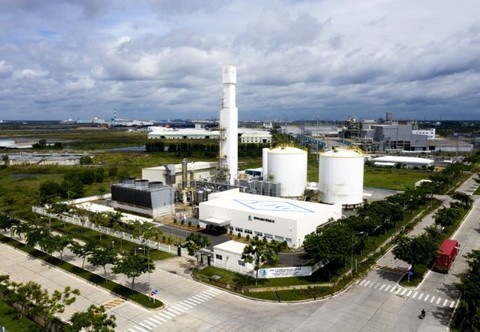
A foreign-invested project in Phú Mỹ Specialised Industrial Park, Bà Rịa - Vũng Tàu Province. FDI has been a major growth driver for Vietnamese economy and is expected to continue the upward trend in the context of rising demand for diversifying the supply chain of multinational manufacturers. — VNA/VNS Photo Hồng Đạt
Việt Nam needs to take drastic actions to get ready for the fourth wave of foreign direct investment (FDI) which is in the making and is expected to leverage the country on the global high-tech map.
The annual report of foreign investment in Việt Nam 2023, announced on Tuesday by the Việt Nam Association of Foreign Invested Enterprises (VAFIE), pointed out that Việt Nam remains an attractive destination for the FDI influx with more than 49,000 foreign enterprises currently operating in the country.
It cited statistics that the FDI flow to Việt Nam rose strongly by 32.1 per cent in 2023 to US$36.61 billion while the global capital only increased slightly by 3 per cent.
FDI has been a major growth driver for the Vietnamese economy and is expected to continue the upward trend in the context of rising demand for diversifying the supply chain of multinational manufacturers, in which Việt Nam has increasing appeal with stable macro-economic conditions, and improving investment environment and labour force quality.
The next FDI boom on the horizon will focus on high-tech fields including semiconductors, electronics, artificial intelligence (AI) and renewable energy to transform the economy into a higher-value ladder and promote long-term growth.
Deputy Minister of Planning and Investment Trần Huy Đông said that the competition among countries in FDI attraction is increasingly fierce, especially in semiconductors, because of the industry’s large potential which could reach more than $1 trillion in 2030.
He said that countries which are quicker in developing appropriate and well-implemented policies will be able to reap the opportunities of the new investment wave.
Việt Nam has been preparing the best conditions to remain attractive to foreign capital and welcome foreign investors in high-tech fields, including infrastructure, support policies and development strategies as well as human resources, he said.
VAFIE’s report said that international organisations and foreign investors are mostly optimistic about the Vietnamese economy, with improved confidence.
However, there are limitations in the investment environment which need to be resolved such as non-transparent and time-consuming administrative procedures, high compliance costs, electricity shortage, lack of high-quality human resource and slow green transition process, the report pointed out.
Improving the legal framework and the efficiency of the regulatory environment is critical for Việt Nam to attract FDI, coupled with improving the infrastructure system, especially energy, digital and transport infrastructure, hastening administrative reform and improving human resource quality, according to VAFIE.
According to the American Chamber of Commerce in Việt Nam, it is necessary to create a more attractive, transparent and stable business environment. “The business climate can best be helped by actions that increase productivity, remove technical barriers and business conditions, and reduce the unnecessary costs of doing business in Việt Nam.”
Phan Hữu Thắng, president of the Institute for International Investment Studies, said the shift in global supply chains is inevitable, and it provides opportunities for Việt Nam to attract high-quality FDI. It’s time for Việt Nam be active in attracting FDI and direct the capital flow into the prioritised sectors, he said.
The formation of specialised industrial parks, high-tech parks and eco industrial parks is important for the future, he said.
The target of achieving an economic growth rate of 6.5 per cent in 2021-25 period for Việt Nam might be challenging, Võ Trí Thành, director of the Institute for Brand and Competitiveness Strategy said. However, the Vietnamese economy is standing at a turning point in which the FDI flows into high-tech industries will help create breakthroughs. — VNS